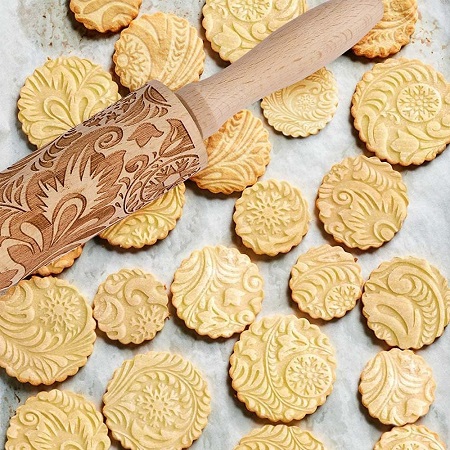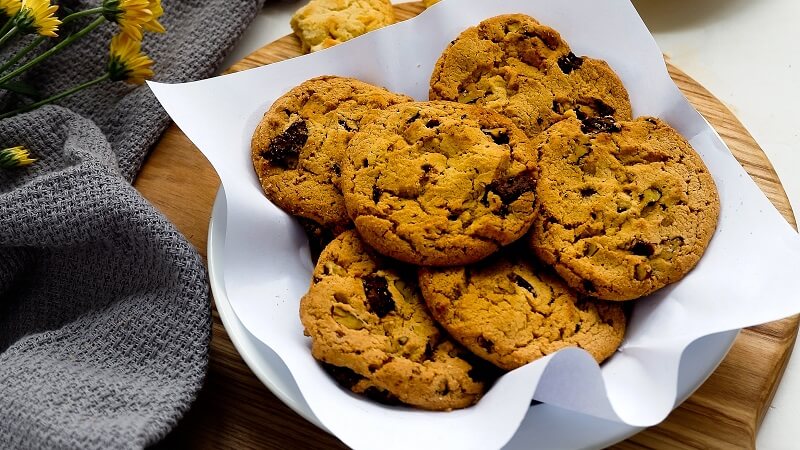
How To Make Homemade Pizza:Essential Tips and Precautions
Learn how to make homemade pizza with a simple, delicious recipe that rivals your favorite restaurant! This dough is a breeze to prepare and bakes

A rolling pin is not just a baking tool; it’s an extension of a baker’s creativity.
When it comes to DIY embossed rolling pins, the material you choose can significantly impact both functionality and design. Let’s explore ten fantastic materials to create your personalized embossed rolling pin.
Wooden rolling pins are beloved for their durability and timeless appeal. Different types of wood like oak, cherry, and maple, each bring unique characteristics to the table.

Oak provides robustness, cherry offers a lighter touch with a smooth finish, and maple is known for its durability and fine grain, perfect for intricate designs.
When creating a DIY wooden rolling pin, understanding the nuances of wood grain and the importance of proper sanding and finishing is crucial for a high-quality result.
Plastic rolling pins, especially those made from food-grade ABS plastic, offer a lightweight and low-maintenance option.
They are easy to clean and can be intricately designed, making them a versatile choice for bakers who enjoy experimenting with different embossing patterns.
Additionally, their affordability makes them an accessible option for those just starting in the world of baking.
Silicone rolling pins are celebrated for their flexibility and non-stick surface, making them perfect for handling sticky doughs like sugar cookies or fondant.
They are incredibly user-friendly and easy to clean, a boon for bakers who prefer a hassle-free baking experience. Plus, their colorful options add a fun and vibrant touch to any baker’s toolkit.
Stainless steel rolling pins are a modern baker’s dream, offering both durability and a sleek design. These rolling pins are easy to clean, resistant to rust, and great for embossing designs.
They are also ideal for bakers who prefer a heavier rolling pin for more controlled rolling, especially for doughs that require a bit more pressure.
Marble rolling pins stand out for their elegance and functionality. Their heavy weight helps flatten doughs more effortlessly, and their cool surface is ideal for pastry doughs, preventing butter from melting too quickly.
They require a bit more care in handling and maintenance but offer a touch of sophistication to the baking process.
Aluminum alloy rolling pins strike a balance between lightweight and durability.
Their heat-conducting properties ensure an even rolling experience, making them suitable for various doughs.
Their ease of customization makes them a popular choice for those looking to create personalized embossed designs.
Bamboo rolling pins are a great choice for eco-conscious bakers.

They are not only sustainable but also feature a natural beauty that adds an aesthetic appeal to the baking experience. Their lightweight and durability make them a practical and stylish choice for any kitchen.
Ceramic rolling pins offer a smooth, non-stick surface ideal for delicate pastries and doughs.
They can be beautifully designed with embossed patterns, making each rolling pin a unique piece of art.
While they require careful handling due to their fragility, they provide an unmatched elegance in baking.
Glass rolling pins are not only functional but also serve as elegant kitchen decor. Their smooth surface is excellent for rolling out various types of dough, and they can be easily cleaned.
While they require careful handling, their visual appeal makes them a favored choice for bakers who value aesthetics as much as functionality.
Composite rolling pins, like those made from wood-plastic composites, combine the best features of multiple materials.
They offer the warmth and traditional feel of wood with the durability and ease of maintenance of plastic.
These rolling pins are ideal for bakers looking for a rolling pin that blends traditional craftsmanship with modern technology.

Whether you’re drawn to the classic warmth of wood, the modern elegance of stainless steel, or the eco-friendliness of bamboo, there’s a material out there that’s perfect for your DIY embossed rolling pin.
Your choice should align with your baking style, aesthetic preferences, and maintenance capabilities. Embrace the joy of DIY and create a rolling pin that’s uniquely yours.


Learn how to make homemade pizza with a simple, delicious recipe that rivals your favorite restaurant! This dough is a breeze to prepare and bakes

Have you ever felt like a screaming cat in the kitchen, especially when your biscuit attempts seem more like baking blunders? Well, it’s time to

Every baker knows that a rolling pin can be both a best friend and a formidable foe in the kitchen. Mastering the art of removing

As the holiday season approaches, the charm of Christmas decorating candy becomes irresistible. It’s not just about the sweetness; it’s about adding a personal touch

Learn how to make homemade pizza with a simple, delicious recipe that rivals your favorite restaurant! This dough is a breeze to prepare and bakes

Have you ever felt like a screaming cat in the kitchen, especially when your biscuit attempts seem more like baking blunders? Well, it’s time to

Every baker knows that a rolling pin can be both a best friend and a formidable foe in the kitchen. Mastering the art of removing

As the holiday season approaches, the charm of Christmas decorating candy becomes irresistible. It’s not just about the sweetness; it’s about adding a personal touch
Copyright © 2024 bakemasterrollingpin. All Rights Reserved.